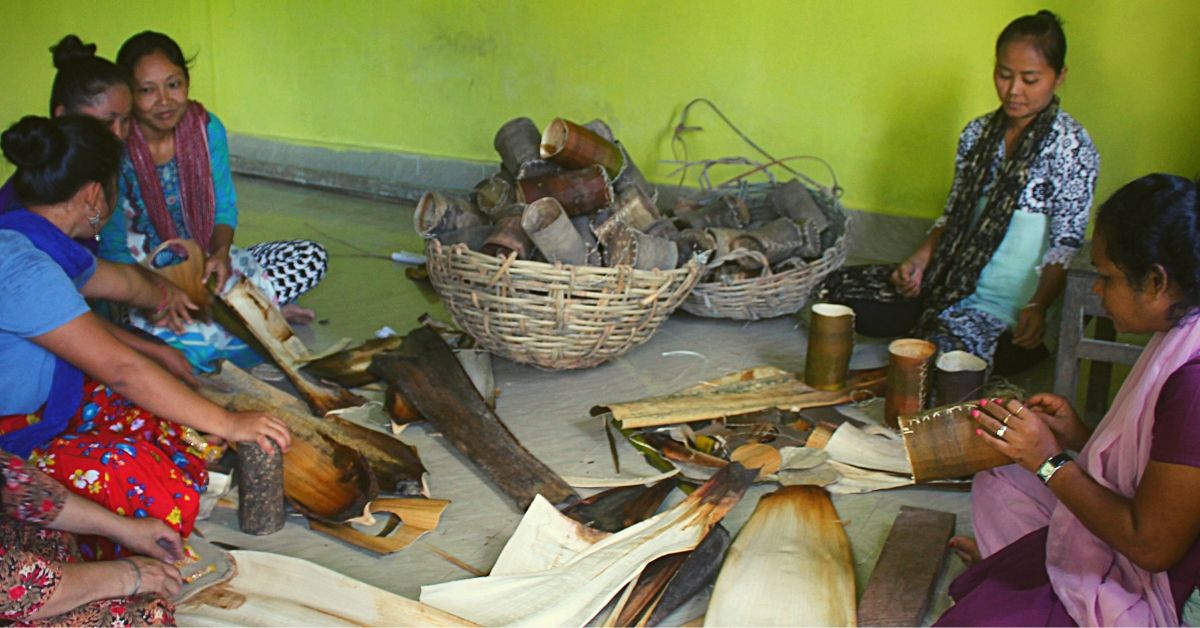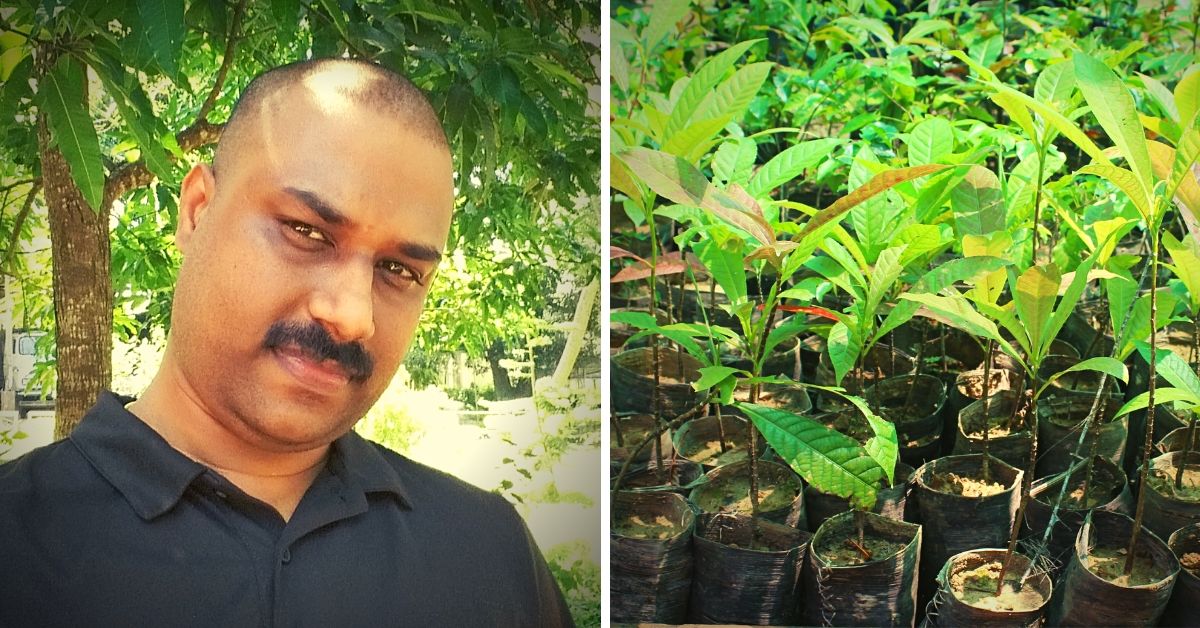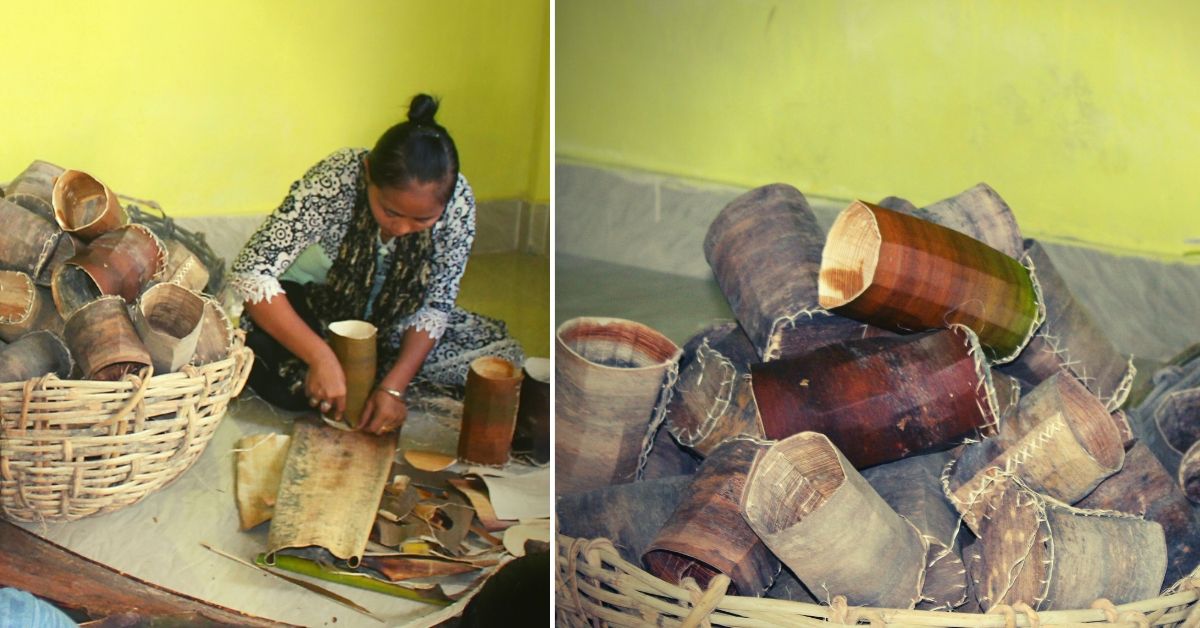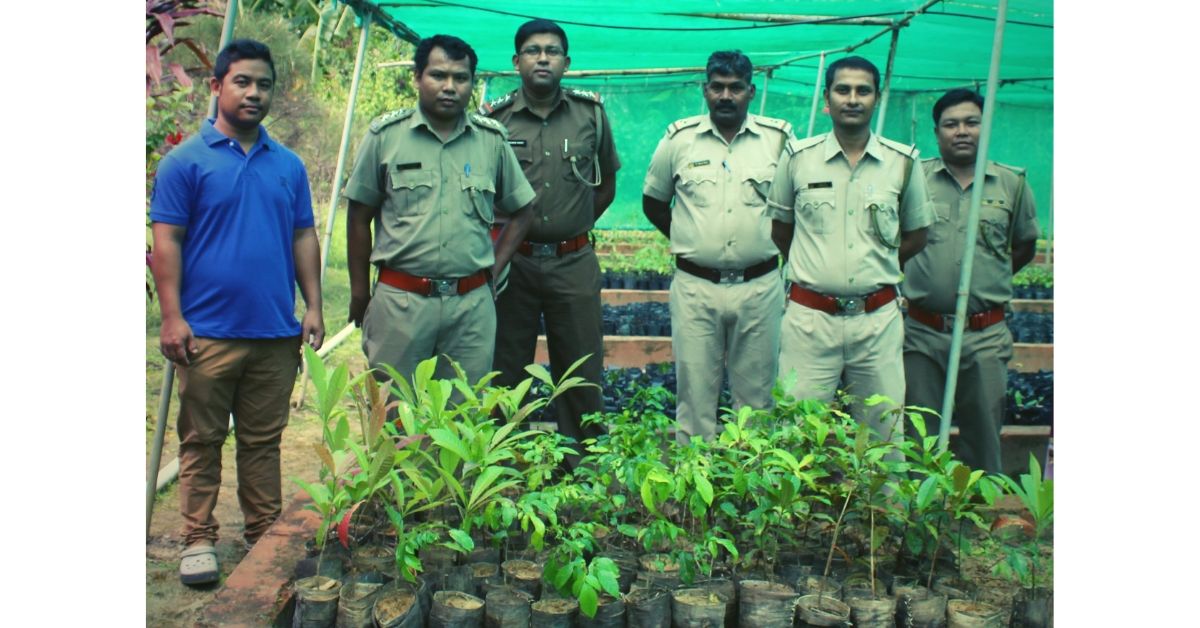Andaman Officer Replaces Plastic Bags In Forest Nurseries With Areca Leaf Sheaths!
Costing less than Rs 1 per container, these Areca sheaths are heat-proof, durable and decay within 3 weeks in wet soil—so the saplings can be planted along with their containers. Brilliant! #LiveGreen #PlasticFreeIndia

On November 12, 2018, when the Union Ministry of Environment, Forests and Climate Change released a directive banning the use of polythene bags, especially in nurseries, several forest department heads were caught in a dilemma.
“In a very short period of time, all of us had to look for alternatives that were both low cost like plastics and durable. People tried jute, bamboo and other materials, but either the cost or its longevity and reliability became an issue,” says Jiss K Varkey IFS, Divisional Forest Officer, Mayabunder to The Better India.
Have a green thumb? Explore our collection of all-organic seeds and start your own farm in your garden, terrace or even a balcony!
Shortly after, he initiated research in Model Nursery, Karmatang village of Mayabunder Forest Division, North and Middle Andaman, to find a cost-effective solution.

The research was an outcome of Varkey’s novel idea that involved using of areca leaf sheath to make seedling containers, as opposed to the standard poly bags.
“Our experiment was to try and use fallen areca leaf sheath (areca catechu) for making eco-friendly seedling containers as an alternative to poly bags. On a pilot basis, seedling containers were made from areca leaf sheaths by labourers in our forest nursery. Later, we standardized the sizes using a wooden cylinder of appropriate volume and used specialized gums to join the ends,” adds Pramod Singh, Range Officer, Karmatang Range.
One of the biggest hurdles in the ideation process was to find the right material, which was as cheap as plastic. According to Varkey, while single-use plastic bags would come up to Re 1 per container, using jute would increase it up to Rs 5.5 per container, plus the transportation costs to bring it from the mainland to the islands.
The solution was to find a locally-sourced alternative.

“There are huge plantations of areca nuts in the area as the locals highly depend on it. The fallen leaves, however, are used as fuel. Owing to its easy availability, we decided to see if we could use them to make the eco-friendly containers, and we were right,” he adds.
The initiative which kickstarted as a pilot in June 2019, has impacted the lives of 10 families through 15 -odd women who are making these containers out of areca leaf sheaths. These women are from a minority community in the Karmatang village. Known as the Karanes, they are said to be of Burmese origin and have been staying in the forests for generations, depending mainly on nature.
The cost of making each container is Re 1, and these women are paid precisely that for each container they make. He adds that in a day, they can make 50-100 such seedling containers.
“Areca leaf sheath has already been in use for making eco-friendly disposable utensils in our country. But this requires proper treatment of the fallen leaf sheaths and supporting machinery to shape them. Our effort was to make seedling containers from the raw leaf sheaths itself only by standardizing the sizes,” he says.
Three seedling containers can be made from an average-sized leaf sheath by folding, stitching or glueing, which does not require any specialized skills. While folding the leaf sheaths at the bottom, the folds automatically developed few pores that allows excess water to percolate so that containers won’t get waterlogged. The areca leaf sheaths remain heat and waterproof and thus have better durability. It also gives sufficient strength for the containers so that roots do not get coiled.
With around 3.3 lakh tonnes of production and total acreage under cultivation of 2.64 lakh hectares, India is currently the highest producer of arecanut in the world. Thus, this material the best kind for affordable and eco-friendly gardening and farming.

“Also, we found that areca leaf sheaths decay within three weeks in wet soil so that seedlings can be planted along with the containers. Thus, seedlings remain intact and sustain in favourable weather. Only fallen leaf sheaths are used for the purpose, and therefore no live plants are harmed,” says Varkey.
After almost six months of growing seedlings in these containers, Varkey and his team are ready to plant these in the ground.
Although at present, only women from Karane community are working on the project, Varkey hopes to spread the impact for the entire community, by inspiring the youth to join in. “The Karane people are largely dependent on the forests for their livelihood and this serves as an amazing opportunity to earn more while contributing to the same forests,” he adds. The Andaman Karane Crafts Society, a registered organization to promote traditional handicrafts made by Karane community in North & Middle Andamahas also expressed their willingness to join this endeavour.
“This has the mass potential for success, and we hope that by 2020, not just our islands but the entire country embraces this model!” he concludes.
Also Read: Kerala Cop Turns Seized Lorry Into Fish Pond, Turns Station Into Organic Farm!
(Edited by Gayatri Mishra)
Like this story? Or have something to share?
Write to us: [email protected]
Connect with us on Facebook and Twitter
If you found our stories insightful, informative, or even just enjoyable, we invite you to consider making a voluntary payment to support the work we do at The Better India. Your contribution helps us continue producing quality content that educates, inspires, and drives positive change.
Choose one of the payment options below for your contribution-
By paying for the stories you value, you directly contribute to sustaining our efforts focused on making a difference in the world. Together, let’s ensure that impactful stories continue to be told and shared, enriching lives and communities alike.
Thank you for your support. Here are some frequently asked questions you might find helpful to know why you are contributing?


This story made me
-
97
-
121
-
89
-
167













